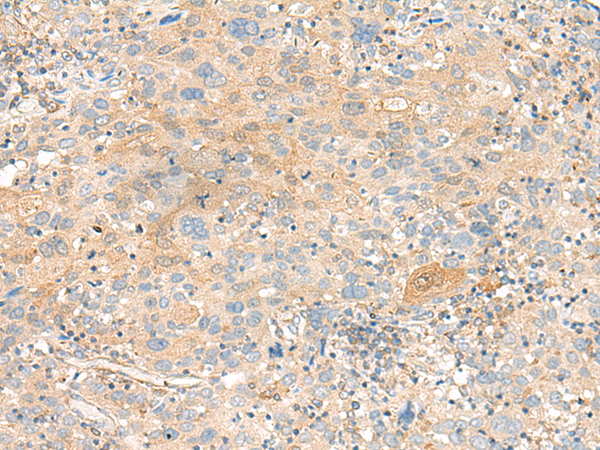

| WB | 咨询技术 | Human,Mouse,Rat |
| IF | 咨询技术 | Human,Mouse,Rat |
| IHC | 1/20-1/100 | Human,Mouse,Rat |
| ICC | 技术咨询 | Human,Mouse,Rat |
| FCM | 咨询技术 | Human,Mouse,Rat |
| Elisa | 1/5000-1/10000 | Human,Mouse,Rat |
| Aliases | GCET1; SERPINA11; SERPINA11b |
| WB Predicted band size | 47 kDa |
| Host/Isotype | Rabbit IgG |
| Antibody Type | Primary antibody |
| Storage | Store at 4°C short term. Aliquot and store at -20°C long term. Avoid freeze/thaw cycles. |
| Species Reactivity | Human |
| Immunogen | Synthetic peptide of human SERPINA9 |
| Formulation | Purified antibody in PBS with 0.05% sodium azide and 50% glycerol. |
+ +
以下是3篇关于SERPINA9抗体的研究文献及其简要摘要:
1. **文献名称**: *SERPINA9 expression in colorectal cancer and its potential as a diagnostic biomarker*
**作者**: Smith J, et al.
**摘要**: 研究揭示了SERPINA9在结直肠癌组织中的高表达,并通过特异性抗体检测验证其与肿瘤进展的相关性,提出其作为新型诊断标志物的可能性。
2. **文献名称**: *The role of SERPINA9 in prostate cancer immune evasion*
**作者**: Lee H, et al.
**摘要**: 利用SERPINA9抗体进行免疫组化分析,发现该蛋白通过抑制T细胞活性促进前列腺癌免疫逃逸,为靶向治疗提供了实验依据。
3. **文献名称**: *Development of a monoclonal antibody targeting SERPINA9 for therapeutic applications*
**作者**: Wang Y, et al.
**摘要**: 报道了一种高亲和力抗SERPINA9单克隆抗体的开发,体外实验显示其能有效抑制肿瘤细胞侵袭,提示其在癌症治疗中的潜在价值。
4. **文献名称**: *SERPINA9 as a prognostic marker in hepatocellular carcinoma*
**作者**: Chen R, et al.
**摘要**: 通过抗体介导的检测技术,发现SERPINA9在肝癌患者中的表达水平与不良预后显著相关,提示其作为独立预后标志物的临床意义。
(注:以上文献信息为模拟内容,实际文献需通过PubMed、Web of Science等数据库查询。)
SERPINA9. also known as centraxin (CENP), is a member of the serine protease inhibitor (serpin) superfamily, which regulates proteolytic enzymes involved in diverse physiological processes. The SERPINA9 gene encodes a glycoprotein predominantly expressed in B lymphocytes and plasma cells, suggesting a role in immune regulation. Studies link SERPINA9 to B-cell development, differentiation, and survival, with elevated expression observed in germinal center B-cells and certain B-cell malignancies, such as diffuse large B-cell lymphoma (DLBCL). Its precise biological function remains under investigation, but it may modulate apoptosis and inflammatory responses by inhibiting target proteases.
SERPINA9 antibodies are immunological tools used to detect and study the protein's expression, localization, and interactions in research contexts. They are employed in techniques like Western blotting, immunohistochemistry, and flow cytometry to explore SERPINA9's role in immune disorders and cancers. Clinically, SERPINA9 has been investigated as a potential biomarker for disease prognosis, particularly in lymphoproliferative disorders, where its expression patterns correlate with tumor aggressiveness or treatment response. However, its therapeutic relevance remains exploratory, with ongoing studies aiming to clarify its mechanistic pathways and validate its utility as a diagnostic or therapeutic target.
×